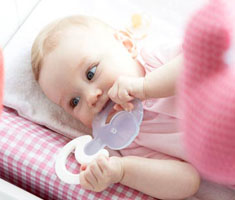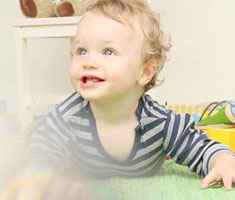![[Translate to Singapore (English):] weeks of pregnancy](/fileadmin/Default/help_and_advice/anticipation/anticipation_ultrasound.jpg)
Here you will find a week-by-week guide to what's happening in your body.
Weeks 1-4
1st week
Your pregnancy begins with the first day of your period – at a time when you're not yet pregnant. This date merely forms the basis for all other calculations. If you are planning to try for a baby, you should rethink your habits and your diet as early as possible and give up smoking.
2nd week
And we're off! When your partner's sperm meets your ovum shortly after ovulation, with a bit of luck they combine to form your baby’s first cell. The miracle of life can take its course.
3rd week
The fertilised ovum travels through the fallopian tubes to the womb. Over the course of the journey, it divides until it is made up of several hundred cells. On reaching its destination, the ovum embeds itself in the mucous membrane of the womb. By this time, not only has it already been decided whether your baby will be a girl or a boy, but also if it will have your or daddy's eyes.
4th week
Deep in the womb, the ovum develops into both your baby and the placenta. Your body reacts with a flood of hormones to make you fit for the coming months. Some women notice this change immediately and suffer from sickness, a rollercoaster of emotions, tender breasts or mild cramps in the lower abdomen. Other women don't even realise they are pregnant.
Weeks 5-8
5th week
By the end of this week, the collection of cells in your stomach has already grown into an embryo. Your baby measures four millimetres and its heart begins to beat. Only now does a missed period indicate that you are expecting a baby. The pregnancy test provides definitive proof of the wonderful news – although you may not feel so wonderful at this stage. The hormones make many women more sensitive and irritable.
6th week
Even at this early stage, all your baby's major organs are forming, including the liver, stomach and intestine. The foundations are also laid for the brain and the spinal cord has formed. And the beginnings of arms and legs are also visible. There are still no noticeable changes in you – apart from possible morning sickness, problems sleeping at night or the exhaustion that accompanies the development of your baby. But you may well experience none of the classic symptoms associated with the initial stages of pregnancy.
7th week
The embryo has grown to around 14 millimetres. The nose, ears and mouth start to form. Even the hands and feet are starting to take shape. At this stage, your breasts become larger and heavier in preparation for breastfeeding. You may also be surprised by changes in your sense of smell and taste. You suddenly develop new likes and dislikes.
8th week
Your baby now weighs around 1.5 grams. Its heart beats twice as fast as yours. The head appears to grow disproportionate to the body. The baby begins to develop an optic nerve and a little tongue. The spinal column begins to develop around the spinal cord. It's almost time for your first ultrasound. The excitement of seeing the first photo of your baby is also an incentive for the father to come along to the appointment. Avoid excessive physical exertion, as it can cause the womb to contract and can result in a miscarriage in extreme cases. However, it is generally extremely difficult to harm your pregnancy at this stage.
Weeks 9-12
9th week
The embryo already measures 20 millimetres and the head still takes up most of the room in your tummy. The neck now separates it from the rest of the body and your baby’s face continues to form. The eyes and eyelids have already formed and now it's time for the lips and tooth germs. A healthy, balanced diet is essential during this stage of rapid development. Fresh, easily digestible food is best, to ensure that you are able to pass on enough vitamins and minerals to your baby.
10th week
Your embryo now measures around three centimetres and weighs around 13 grams. Your baby is now “complete”, all organs are in place and the heart is now divided into a left and a right side. Now all your baby has to do is grow and develop. And this will also be reflected in your mood. The hormones in your blood pass on every feeling of happiness, but also every form of stress. Your kidneys begin to work more, your blood volume will increase by around 35 percent and your womb will grow from around 70 grams at the start of the pregnancy to around 1,000 grams in the final stages.
11th week
The embryo becomes a foetus. The face in particular begins to take on human traits - the eyes and ears are in the right position. The mouth and nose continue to develop, eyelids now cover the eyes and the eyeball is maturing underneath. You will find yourself getting out of breath more easily. Your heart beats faster as the amount of blood in your body increases, forcing your heart to work harder. Around 25 percent of your blood is needed purely for the placenta.
12th week
The baby begins to move around. While this is only a reflex action at this stage, your baby’s newly developed muscles enable it to move its arms and legs, turn its head and make a fist. A set of adult teeth forms underneath the milk teeth already in place. Your sickness and tiredness symptoms begin to pass. You already have the first three months behind you and will have gained up to two kilograms in weight. Only around 48 grams of that weight can be attributed to your baby. The rest is distributed over the placenta and amniotic fluid, the breasts and the larger womb.
Weeks 13-16
13th week
Your baby now has its first bones. The leg and pelvic bones are now visible and the ribs are forming. The golden rule for you is everything in moderation and stop as soon as it gets difficult – even sport. Pregnant women feel especially comfortable in water. The water relieves the pressure from your joints and difficult movements become easier again.
14th week
A trained eye will now be able to tell if you are having a girl or a boy. The gonadal now start producing the hormones required to develop external genitals. Are you over 35? No need to worry. If no difficulties arise, your pregnancy should run completely as normal.
15th week
Your baby is now able to open and close its mouth and make sucking movements. Its skeleton continues to develop. Your doctor can measure the circumference of your baby’s head using ultrasound. Your waist disappears, your tummy gets rounder and you start to grow out of your skirts and trousers. Pregnant women often find that their face looks softer and more radiant. This may be due to completely normal fluid retention under the skin.
16th week
Your baby's thyroid begins working and produces hormones for various tasks, such as ensuring growth. The thyroid needs iodine to work properly which is found in food such as fish. Many doctors recommend taking iodine supplement tablets, as iodine is lacking in many of our foods.
Weeks 17-20
17th week
Your baby now measures around 16 centimetres from head to toe and weighs around 135 grams. It continues to get oxygen from your blood. Your baby already makes irregular breathing movements, however, although they serve no function at this stage. The baby practices the complicated interplay between breathing and swallowing. You start to sweat more easily. This is due to the increase in your bodily temperature during pregnancy. This is completely normal – as is the significant increase in vaginal secretion.
18th week
You finally feel your baby’s first kick – and what a kick it is! Your baby kicks or punches you with its entire body. Most women feel great in both body and soul during this stage of the pregnancy. Complaints associated with the initial stages of pregnancy are gone for good. You look forward to your baby’s arrival more each day. It is normal to feel warmer than usual. While this is pleasant in winter, it may be a little uncomfortable in summer.
19th week
Your baby's nerve fibres net together more, the muscles become stronger, the movements more defined and the fine motor skills begin to develop. To build up its muscles still further, your baby follows its own fitness regime of grabbing, turning, kicking and punching. Your baby slowly starts to put on fat. By this stage at the latest, your baby bump will be clearly visible.
20th week
You’ve reached the half-way mark - and your baby can hear. Not only can it hear your heart beat and your blood rushing around your body, but noises from outside as well. Music, noise, people and their voices in particular. Your baby now has all twelve to fourteen billion nerve cells. And you are faced with the question "To breastfeed or not to breastfeed?" – at the latest when single drops of milk start to emerge from your breasts. This means your body is busy preparing for the period after your baby is born.
Weeks 21-24
21st week
Your baby measures around 21 centimetres from head to toe and weighs around 330 grams. It sleeps for between 16 and 20 hours each day – sometimes deep, sometimes light. It spends the rest of the day doing its "fitness regime". The pressure put on your organs by the womb at this stage can sometimes cause the sphincter to the stomach to stay open. This causes acid to flow back and results in heartburn in one in two pregnant women. Increased fluid retention can also cause feet and hands to swell slightly – uncomfortable but completely normal.
22nd week
Your baby's skin is now opaque and red in colour. But it is still wrinkled as your baby's body is still thin and hasn't yet gained enough fat. Personal hygiene becomes ever more important for you, as your tummy and breast tissue is under immense strain from the rapid growth. Lots of moisture for the skin and pregnancy massages will make you feel more comfortable Stretch marks may appear, but will fade after your baby is born.
23rd week
Your baby grows thin hair. Nails begin to grow too. The brain cells mature and your baby is able to understand and remember. You may experience tingling or heavy legs at this stage. Pregnant women may also suffer from varicose veins and haemorrhoids.
24th week
Your baby's head now measures around six centimetres in diameter. From the vertex to the soles of its feet, the little tyke now measures around 26 centimetres and weighs around 500 grams. The eyes are still closed but the eyelashes are growing. And your baby can dream, just like you dream of its arrival. Towards the end of this week, the womb can reach the height of the navel. Why not make the most of the remaining time and take a relaxing holiday with your partner. The more involved your partner is in your pregnancy, the greater his understanding – and his joy.
Weeks 25-28
25th week
Your baby takes in amniotic fluid through the mouth and skin, some of which is released again as urine. Towards the end of the pregnancy, the amniotic fluid is replaced within two hours. The quantity fluctuates between 300 millilitres and 1.5 litres. Your own organs are pushed out of their original position by your rapidly growing baby. Breathing can become more difficult and you may need to go to the toilet more often.
26th week
Your baby now measures around 30 centimetres from head to toe and weighs around 650 grams. If your baby is born prematurely at this stage, it has a chance of survival. Your tummy may already be very round. You may find that the stretched skin itches more and more frequently, but this can be easily controlled by applying moisturising oils. You may also have difficulty getting to sleep.
27th week
Your baby's skin looses all its wrinkles and starts to smooth out, as the growing fat deposits become more visible. Your baby lives alongside you - it doesn’t miss a thing that goes on, both inside and outside your body. And your baby won’t hesitate to let you know with kicks and punches. The first milk, otherwise known as colostrum, may already be forming in your breasts at this stage. This milk is easy to digest and will provide your baby’s first meals after it is born until the actual breast milk is produced.
28th week
Your baby opens its eyes and can distinguish between light and dark. It drinks more and more amniotic fluid. Almost all the liquid passes through the digestive system, is filtered by the kidneys and passed out again. Up to half a litre of urine enters the amniotic fluid each day. You gain weight rapidly. Not only is the baby growing, but the placenta and the amniotic sac also add to your weight. Fat deposits form over your body, which you should under no circumstances try to combat with a diet.
Weeks 29-32
29th week
Your baby's brain continues to develop. A complex network of nerves is formed. Each "thread" in this network is insulated with a protective sleeve to enable stimuli to be transmitted more quickly. The nerve fibres are created. Pregnant women often put on half a kilo during this week alone. Your tummy gets bigger and bigger. Your navel starts to protrude outwards.
30th week
Your unborn baby's skin starts to change colour from red to pink. Its little body becomes rounder thanks to the fat deposits which can now account for up to eight percent of your baby’s weight. Has a straight, dark line appeared in the middle of your tummy? That is known as the linea nigra, which can appear due to the increased pigmentation in your skin. It will disappear again at some point after your baby is born.
31st week
Your baby continues to drink lots of fluid, which is processed by the kidneys, stomach and intestine. It is thought that the amniotic fluid changes its taste depending on the diet of the mother. Your little one is also discovering a sense of taste. Be particularly careful of infections. Bacteria and viruses can pass through the placental barrier at this stage, as the villous wall has become thinner to allow larger quantities of nutrients to enter.
32nd week
Your baby is beginning to get cramped in your tummy. It moves less and focuses more on finding a comfortable position. If your baby were to be born now, it would probably survive. Although its lungs are not yet fully developed, medical technology can support your baby’s breathing, giving it a good chance of survival. The womb may contract in preparation for childbirth. These contractions last around 20 seconds and you may not feel a thing. However, you may feel pain in your pelvis as it expands.
Weeks 33-36
33rd week
Your baby can measure up to 40 centimetres and weigh up to 1,700 grams by this stage. It now turns into the delivery position. In 95 percent of cases, the head points downwards and is the first part of the body to come into the world. Avoid trying to compensate for your excess weight by leaning backwards. This changes your perspective, as well as your centre of gravity. This may mean that you frequently bump into or drop things.
34th week
Your baby's blood contains a higher level of calcium than your own. It needs this amount for its bones to grow. The placenta obtains the calcium your baby needs by tapping into the mothers calcium reserves. Note: maternity leave starts at the end of this week.
35th week
Most babies turn into their final delivery position by this stage at the latest. Your thoughts are focussed more and more on the arrival of your child. What will it look like?
36th week
Your baby does not yet have an immune system of its own. It gets its antibodies from you and is protected against everything you have developed antibodies against. You may experience irregular pre-labour contractions. Some of these contractions may be strong and painful. But they don't happen frequently, nor do they occur at regular intervals. That is the difference from real contractions, which happen at regular intervals.
Weeks 37-40
37th week
Your baby continues to grow and is already around 45 centimetres in size and weighs around 2,400 grams. Your placenta now measures between 20 and 25 centimetres, is three centimetres thick and weighs around 500 grams. Large enough to guarantee the exchange of nutrients and waste between you and your baby.
38th week
Your baby produces cortisone, a hormone that prepares the lungs for baby's first breath. From the moment your baby is born, its blood circulation is separate from your own and no longer connected to yours. If you are experiencing fear or uncertainty regarding the upcoming birth - that is completely normal.
Many pregnant women become extremely active just before they give birth, cleaning windows and wiping down cupboards. Cleaning out the "nest" for the new arrival. There is no need to fight this "nesting instinct". Have your bag packed and ready for the hospital or birth centre.
39th week
There's not enough room. Your "lodger" has wrapped its arms around its chest, bent its legs and hardly moves at all at this stage. Don't worry if your baby doesn't move as frequently. After all, your baby is now around 50 centimetres in size and weighs around 3,000 grams.
40th week
There are many little signs to indicate that your baby will soon arrive – such as sudden tiredness or nausea. This is due to the hormonal changes designed to trigger the birth. Make your way to hospital when your waters break or you notice bleeding. You should also make your way to the hospital if you have been having regular contractions every five to ten minutes for over an hour at least.

![[Translate to Singapore (English):] weeks of pregnancy](/fileadmin/Default/help_and_advice/anticipation/anticipation_stage_2.jpg)



